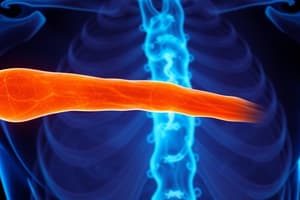Podcast
Questions and Answers
Which of the following conditions is most likely to be associated with muscle pain and possible myocarditis?
Which of the following conditions is most likely to be associated with muscle pain and possible myocarditis?
- Dermatomyositis
- Coxsackie B virus (correct)
- Rhabdomyosarcoma
- Strain injury
What type of myositis includes symptoms affecting muscles as well as other organs such as the skin?
What type of myositis includes symptoms affecting muscles as well as other organs such as the skin?
- Polymyositis
- Dermatomyositis (correct)
- Fibromyalgia
- Inclusion body myositis
Which of the following tumors is derived from skeletal muscle cells and has a peak incidence in childhood?
Which of the following tumors is derived from skeletal muscle cells and has a peak incidence in childhood?
- Malignant fibrous histiocytoma
- Rhabdomyosarcoma (correct)
- Fibroma
- Liposarcoma
Which of the following is NOT a complication associated with wounds infected by clostridia?
Which of the following is NOT a complication associated with wounds infected by clostridia?
What is the primary factor on which the prognosis of malignant neoplasms of muscle and soft tissue depends?
What is the primary factor on which the prognosis of malignant neoplasms of muscle and soft tissue depends?
What is the basic unit of skeletal muscle?
What is the basic unit of skeletal muscle?
Which neurotransmitter is released at the neuromuscular junction to initiate muscle contraction?
Which neurotransmitter is released at the neuromuscular junction to initiate muscle contraction?
What is characterized by uncoordinated contraction of muscle fibers?
What is characterized by uncoordinated contraction of muscle fibers?
What is the primary cause of neurogenic atrophy?
What is the primary cause of neurogenic atrophy?
Which type of muscular dystrophy is characterized by a deficiency of dystrophin?
Which type of muscular dystrophy is characterized by a deficiency of dystrophin?
What is a common symptom of Myasthenia gravis?
What is a common symptom of Myasthenia gravis?
What is the primary inheritance pattern of Myotonic dystrophy?
What is the primary inheritance pattern of Myotonic dystrophy?
How is Becker muscular dystrophy different from Duchenne muscular dystrophy?
How is Becker muscular dystrophy different from Duchenne muscular dystrophy?
What is a characteristic feature of congenital myopathies?
What is a characteristic feature of congenital myopathies?
Which condition is characterized by inflammation of muscle tissue?
Which condition is characterized by inflammation of muscle tissue?
Study Notes
Musculoskeletal System Pathology
Skeletal Muscle Structure
- Myocyte is the basic unit of muscle, containing actin and myosin.
- Myocytes form muscle fibers, which are grouped into fascicles.
- Connective tissue layers surround muscle components.
- Neuromuscular junction connects muscle fibers with lower motor neurons; acetylcholine (Ach) acts as the neurotransmitter.
Muscle Functions
- Responsible for movement, heat generation, posture maintenance, and breathing.
- Stores glycogen and fat.
Muscle Symptom Terminology
- Weakness: Inadequate contraction capability.
- Fatigability: Inability to sustain a muscle contraction.
- Spasm: Continuous muscle contraction (myotonus).
- Fibrillation: Uncoordinated contractions of muscle fiber groups.
- Myalgia: Muscle pain.
Muscle Pathophysiology
- Muscle and nerve function as a unit; nerve severance leads to muscle atrophy.
- Chemical neurotransmitters facilitate muscle contractions.
- Contraction needs normal muscle cells, contractile proteins, and sufficient energy.
- Hormonal influence and toxins/drugs can impair muscle function.
- Muscle cells show limited regenerative capability.
Types of Muscle Atrophy
Neurogenic Atrophy
- Results from nerve injury to muscles.
Upper Motor Neuron Injury
- Affects neurons in the central nervous system (CNS).
- Can be due to strokes, amyotrophic lateral sclerosis (ALS), or spinal tract injury.
Lower Motor Neuron Injury
- Affects motor neurons in the anterior horn of the spinal cord.
- Common causes include poliomyelitis, nerve root compression, axonal injury, or branch injury.
Myasthenia Gravis
- Autoimmune disease characterized by reduced ACh receptors.
- Anemia of antibodies against ACh receptors prevents ACh from binding.
- Signs include easy fatigability and muscle weakness, often associated with thymus abnormalities.
- Diagnosis involves clinical changes and specific tests (anticholinesterase test and antibody detection).
Muscular Dystrophies
- Progressive muscle weakness and wasting due to inherited conditions.
Duchenne Muscular Dystrophy
- Genetic defect in dystrophin, an essential protein in muscle cells.
- X-linked recessive inheritance affects primarily males.
- Symptoms appear by age 5; wheelchair dependence by age 10-12; early mortality.
- Cognitive impairment may occur.
Becker Muscular Dystrophy
- Milder variant of Duchenne, with onset in puberty and longer life expectancy (40-50 years).
Myotonic Dystrophy
- Second most common muscular dystrophy caused by myotonin protein kinase mutation.
- Autosomal dominant inheritance; symptoms emerge during adulthood.
- Associated with muscle wasting, mental issues, diabetes, and characteristic myotonia.
Myopathies
Congenital Myopathies
- Early onset, non-progressive or slowly progressive muscle diseases, often leading to hypotonia and joint contracture.
Acquired Myopathies
- Non-specific muscle weakness due to various identifiable causes (metabolic, hormonal).
- Examples include diabetic myopathy and cancer-related myopathy.
Myositis
- Inflammation of muscle, which can be infectious or immune-related.
Infectious Myositis
- Viral: Typically self-limited (e.g., influenza).
- Bacterial: From localized infections, with severe complications like tetanus.
- Parasitic: Trichinella spiralis from undercooked pork.
Immune Myositis
- Includes polymyositis (muscle-focused), dermatomyositis (muscle + skin), and myositis associated with conditions like SLE.
Primary Tumors of Muscle and Soft Tissue
Benign Neoplasms
- Common types include fibroma, lipoma, and hemangioma.
Malignant Neoplasms
- Rhabdomyosarcoma: Cancer derived from skeletal muscle; most prevalent in children.
- Malignant fibrous histiocytoma: Originates from undifferentiated connective tissues.
- Liposarcoma: Cancer of adipocytes.
- Prognosis influenced by tumor size, location, and histology.
Studying That Suits You
Use AI to generate personalized quizzes and flashcards to suit your learning preferences.
Description
Test your knowledge on various types of myositis, their associations with infections and autoimmune diseases, and the implications of primary tumors of muscle and soft tissue. The quiz covers conditions like polymyositis, dermatomyositis, and complications associated with viral and bacterial infections.




